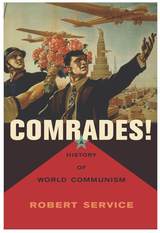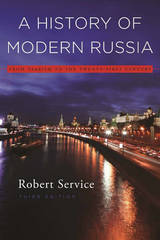



Russia has had an extraordinary history in the twentieth century. As the first Communist society, the USSR was both an admired model and an object of fear and hatred to the rest of the world.
How are we to make sense of this history? A History of Twentieth-Century Russia treats the years from 1917 to 1991 as a single period and analyzes the peculiar mixture of political, economic, and social ingredients that made up the Soviet formula. Under a succession of leaders from Lenin to Gorbachev, various methods were used to conserve and strengthen this compound. At times the emphasis was upon shaking up the ingredients, at others upon stabilization. All this occurred against a background of dictatorship, civil war, forcible industrialization, terror, world war, and the postwar arms race. Communist ideas and practices never fully pervaded the society of the USSR. Yet an impact was made and, as this book expertly documents, Russia since 1991 has encountered difficulties in completely eradicating the legacy of Communism.
A History of Twentieth-Century Russia is the first work to use the mass of material that has become available in the documentary collections, memoirs, and archives over the past decade. It is an extraordinarily lucid, masterful account of the most complex and turbulent period in Russia's long history.

Lenin’s politics continue to reverberate around the world even after the end of the USSR. His name elicits revulsion and reverence, yet Lenin the man remains largely a mystery. This biography shows us Lenin as we have never seen him, in his full complexity as revolutionary, political leader, thinker, and private person.
Born Vladimir Ilyich Ulyanov in 1870, the son of a schools inspector and a doctor’s daughter, Lenin was to become the greatest single force in the Soviet revolution—and perhaps the most influential politician of the twentieth century. Drawing on sources only recently discovered, Robert Service explores the social, cultural, and political catalysts for Lenin’s explosion into global prominence. His book gives us the vast panorama of Russia in that awesome vortex of change from tsarism’s collapse to the establishment of the communist one-party state. Through the prism of Lenin’s career, Service focuses on dictatorship, the Marxist revolutionary dream, civil war, and interwar European politics. And we are shown how Lenin, despite the hardships he inflicted, was widely mourned upon his death in 1924.
Service’s Lenin is a political colossus but also a believable human being. This biography stresses the importance of his supportive family and of its ethnic and cultural background. The author examines his education, upbringing, and the troubles of his early life to explain the emergence of a rebel whose devotion to destruction proved greater than his love for the “proletariat” he supposedly served. We see how his intellectual preoccupations and inner rage underwent volatile interaction and propelled his career from young Marxist activist to founder of the communist party and the Soviet state—and how he bequeathed to Russia a legacy of political oppression and social intimidation that has yet to be expunged.

Since the fall of communism, Russia has witnessed a dramatic struggle between old and new, continuity and change. Corruption and violence have plagued society. Most people have benefited little from the new capitalist order. But positive changes are evident. Russians can speak and act more freely in a state that no longer intrudes on their privacy. They are able to travel abroad, enjoy unprecedented access to information from around the world, and organize and campaign for improvement in their living conditions.
In this engrossing account Robert Service traces the formation of the new Russia from the end of the Soviet Union in 1991 to the present. He paints a fascinating picture of a people in metamorphosis. In wide-ranging discussions on topics from Kremlin politics to rock music and macroeconomics to contemporary poetry, Service takes us inside to witness the changes from both the top down and the bottom up. He examines the reforms of the Yeltsin and Putin administrations in the context of the complex communist legacy, deftly interweaving political history, intellectual thought, and popular consciousness to illuminate the real difficulties Russia has faced on its rocky path to reform.
For the second time in less than a century, the Russians have been engaged in a fundamental reshaping of their society, and the results will prove of vital importance to the global community. Robert Service has provided a valuable and engaging guide to their recent remarkable journey.

Overthrowing the conventional image of Stalin as an uneducated political administrator inexplicably transformed into a pathological killer, Robert Service reveals a more complex and fascinating story behind this notorious twentieth-century figure. Drawing on unexplored archives and personal testimonies gathered from across Russia and Georgia, this is the first full-scale biography of the Soviet dictator in twenty years.
Service describes in unprecedented detail the first half of Stalin's life--his childhood in Georgia as the son of a violent, drunkard father and a devoted mother; his education and religious training; and his political activity as a young revolutionary. No mere messenger for Lenin, Stalin was a prominent activist long before the Russian Revolution. Equally compelling is the depiction of Stalin as Soviet leader. Service recasts the image of Stalin as unimpeded despot; his control was not limitless. And his conviction that enemies surrounded him was not entirely unfounded.
Stalin was not just a vengeful dictator but also a man fascinated by ideas and a voracious reader of Marxist doctrine and Russian and Georgian literature as well as an internationalist committed to seeing Russia assume a powerful role on the world stage. In examining the multidimensional legacy of Stalin, Service helps explain why later would-be reformers--such as Khrushchev and Gorbachev--found the Stalinist legacy surprisingly hard to dislodge.
Rather than diminishing the horrors of Stalinism, this is an account all the more disturbing for presenting a believable human portrait. Service's lifetime engagement with Soviet Russia has resulted in the most comprehensive and compelling portrayal of Stalin to date.

Robert Service completes his masterful trilogy on the founding figures of the Soviet Union in an eagerly anticipated, authoritative biography of Leon Trotsky.
Trotsky is perhaps the most intriguing and, given his prominence, the most understudied of the Soviet revolutionaries. Using new archival sources including family letters, party and military correspondence, confidential speeches, and medical records, Service offers new insights into Trotsky. He discusses Trotsky’s fractious relations with the leaders he was trying to bring into a unified party before 1914; his attempt to disguise his political closeness to Stalin; and his role in the early 1920s as the progenitor of political and cultural Stalinism. Trotsky evinced a surprisingly glacial and schematic approach to making revolution. Service recounts Trotsky’s role in the botched German revolution of 1923; his willingness to subject Europe to a Red Army invasion in the 1920s; and his assumption that peasants could easily be pushed onto collective farms. Service also sheds light on Trotsky’s character and personality: his difficulties with his Jewish background, the development of his oratorical skills and his preference for writing over politicking, his inept handling of political factions and coldness toward associates, and his aversion to assuming personal power.
Although Trotsky’s followers clung to the stubborn view of him as a pure revolutionary and a powerful intellect unjustly hounded into exile by Stalin, the reality is very different. This illuminating portrait of the man and his legacy sets the record straight.
READERS
Browse our collection.
PUBLISHERS
See BiblioVault's publisher services.
STUDENT SERVICES
Files for college accessibility offices.
UChicago Accessibility Resources
home | accessibility | search | about | contact us
BiblioVault ® 2001 - 2024
The University of Chicago Press









